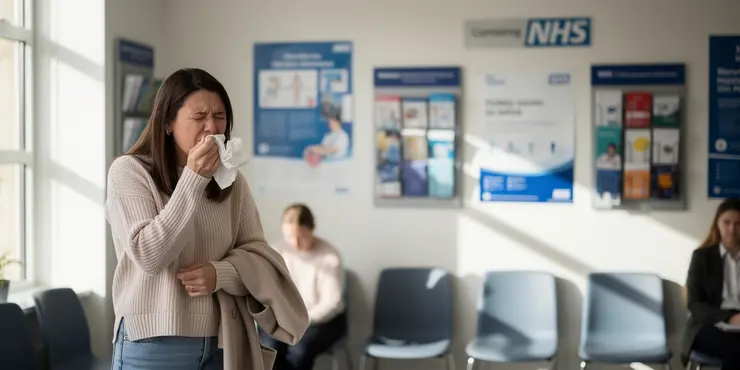
Find Help
More Items From Ergsy search
-
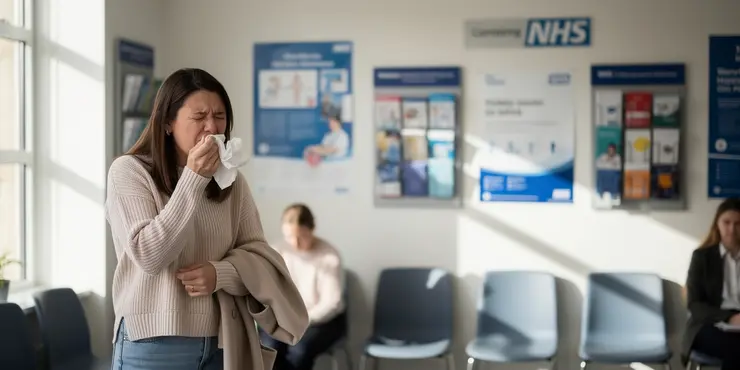
What is hay fever?
Relevance: 100%
-

Hay fever advice | NHS
Relevance: 94%
-
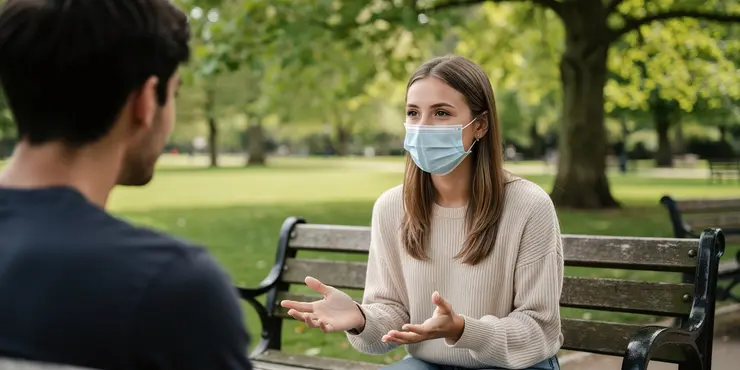
Do masks help with hay fever?
Relevance: 93%
-
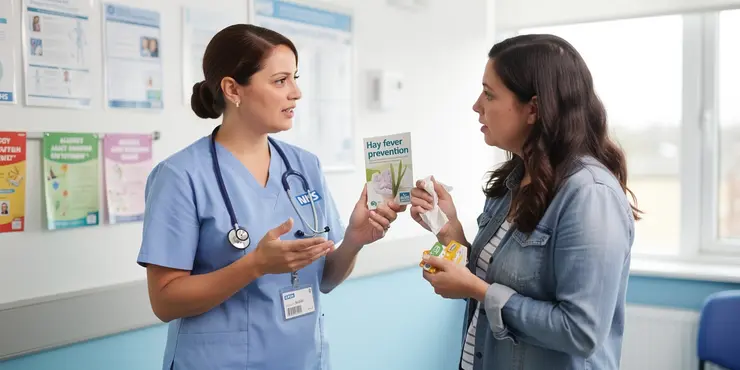
Can hay fever be prevented?
Relevance: 93%
-

What are the common symptoms of hay fever?
Relevance: 92%
-
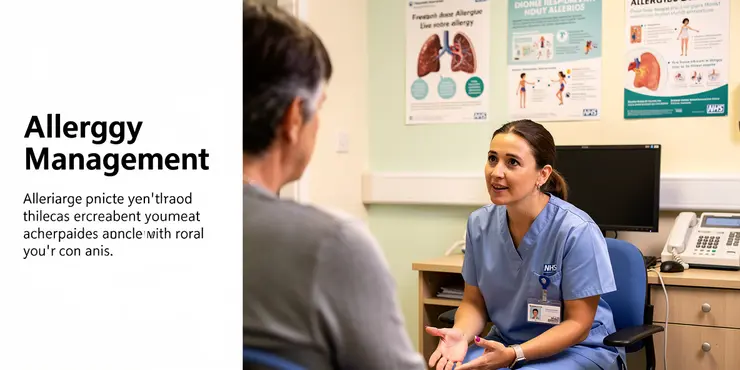
Is there a link between hay fever and asthma?
Relevance: 92%
-
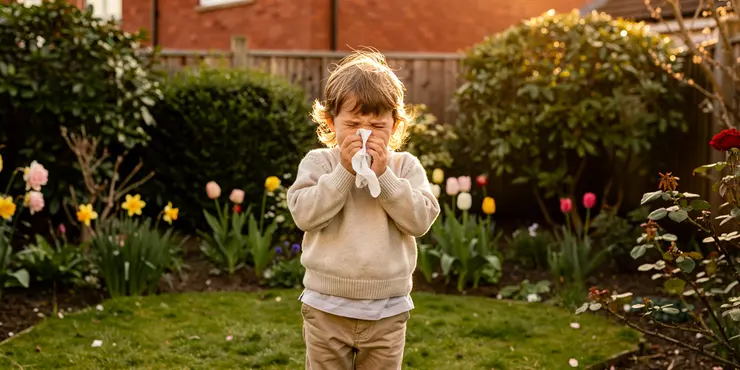
Can children develop hay fever?
Relevance: 91%
-

Can hay fever occur year-round?
Relevance: 90%
-
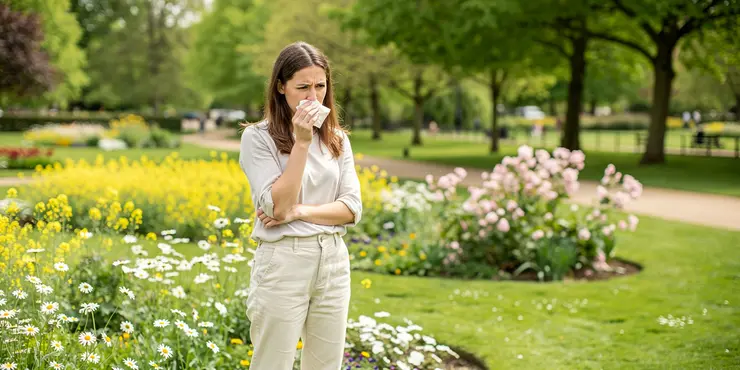
Are some people more prone to hay fever?
Relevance: 89%
-

Do pets contribute to hay fever?
Relevance: 88%
-
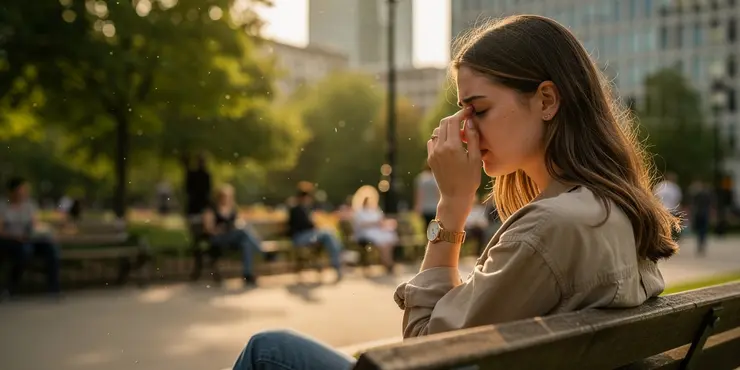
Is hay fever more common in urban areas?
Relevance: 88%
-

Can diet influence hay fever symptoms?
Relevance: 88%
-

Antihistamines how they work with hay fever
Relevance: 87%
-

Can hay fever symptoms mimic other conditions?
Relevance: 86%
-
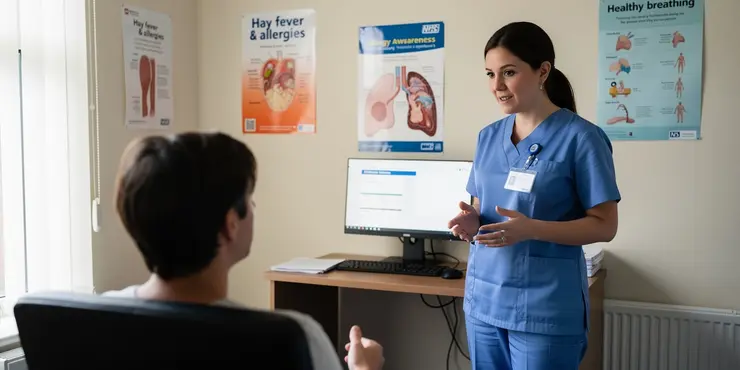
Do all plants produce pollen that causes hay fever?
Relevance: 86%
-
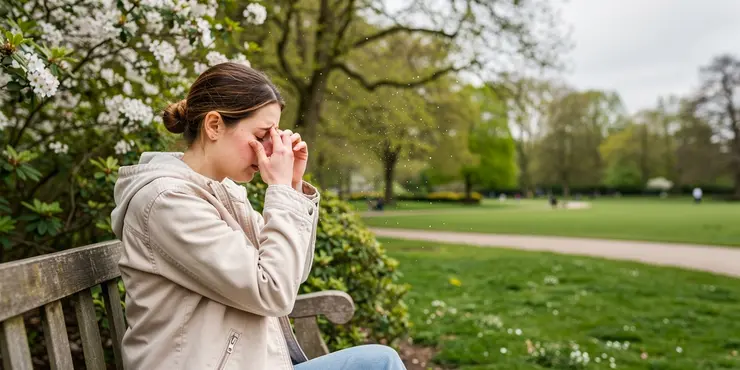
How does pollen affect people with hay fever?
Relevance: 85%
-

Why are experts warning of rising hay fever cases?
Relevance: 85%
-
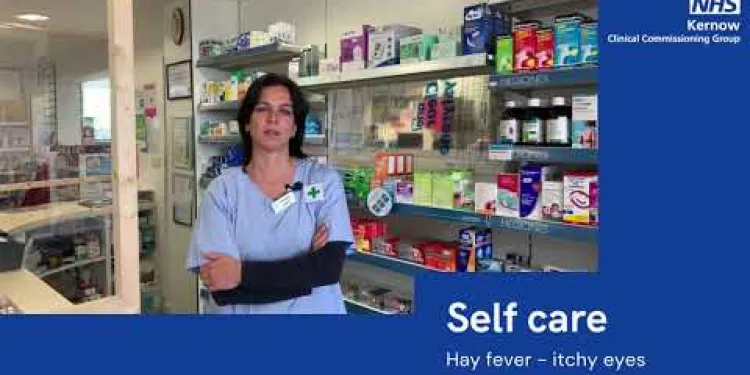
Self care - hay fever itchy eyes
Relevance: 84%
-
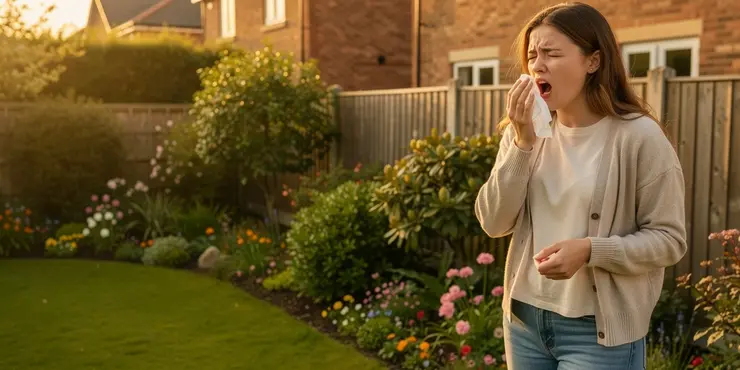
Experts Warn of Rising Hay Fever Cases as Pollen Counts Surge
Relevance: 81%
-

Can mosquito screens help reduce hay fever symptoms?
Relevance: 77%
-
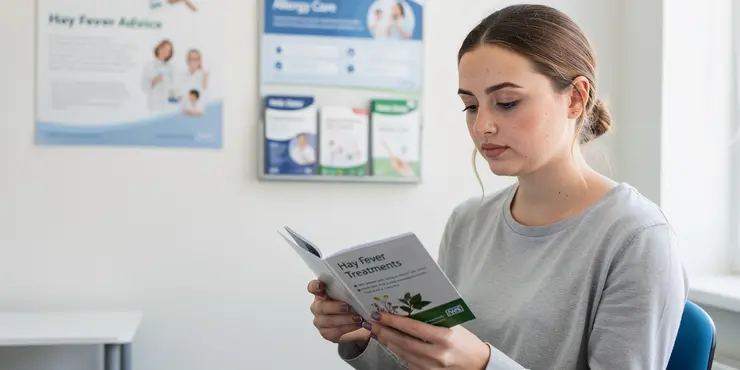
Are there any treatments for hay fever?
Relevance: 68%
-

How long does a typical hay fever season last?
Relevance: 58%
-
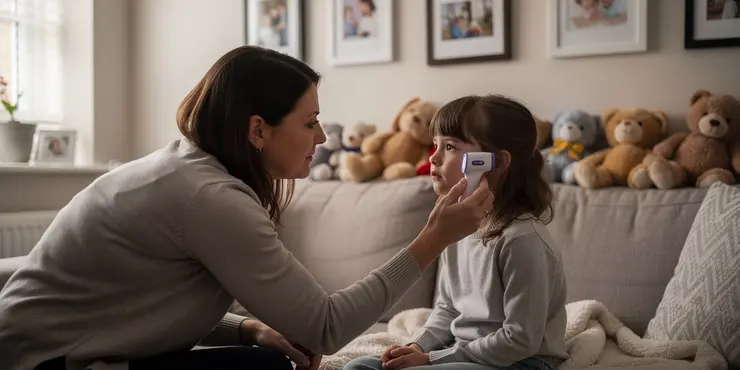
Caring for a child with fever | NHS
Relevance: 40%
-

Can dengue fever be contracted in the UK?
Relevance: 39%
-

Is there a risk of yellow fever being spread by mosquitoes in the UK?
Relevance: 39%
-

How to treat glandular fever | NHS
Relevance: 39%
-
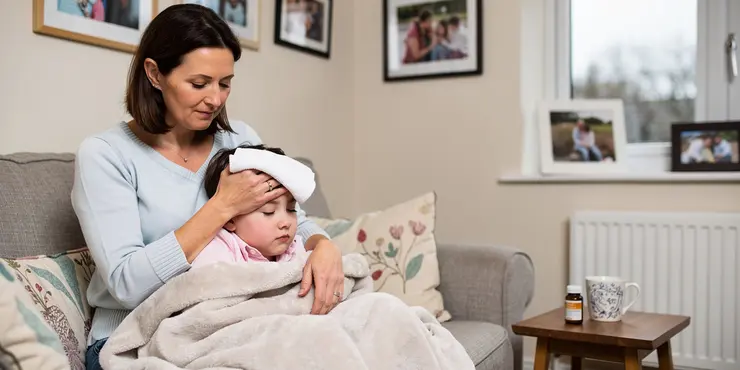
Which medication should be avoided for children with fevers?
Relevance: 37%
-
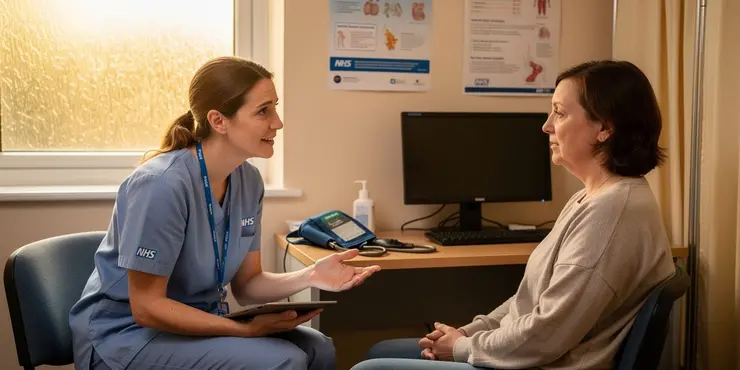
What is Dengue Fever?
Relevance: 33%
-

Can lifestyle changes help manage pain and fever during pregnancy?
Relevance: 32%
-
Can Dengue fever be transmitted through blood transfusions?
Relevance: 30%
-

What are some common conditions treated with homeopathy?
Relevance: 18%
-
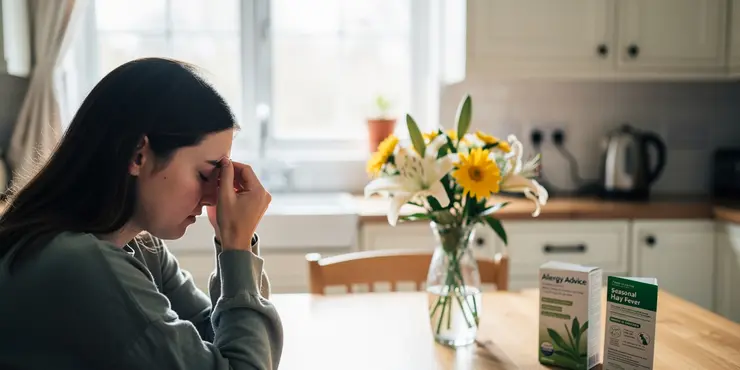
Dealing with Seasonal Allergies
Relevance: 17%
-

Are there safer alternatives to paracetamol for pregnant individuals experiencing pain or fever?
Relevance: 17%
-
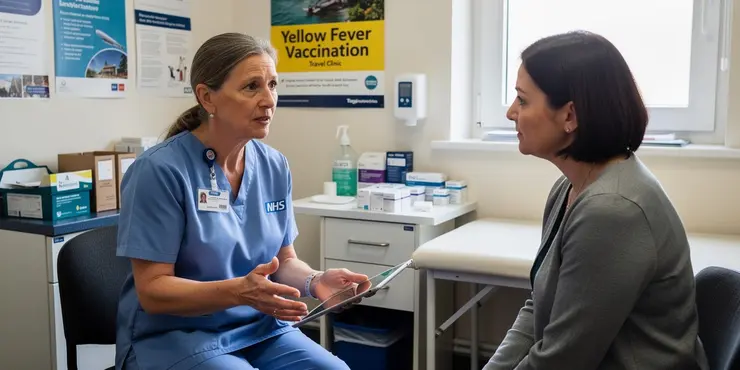
Are any vaccines available in the UK for mosquito-borne diseases?
Relevance: 17%
-

Who is at risk of developing eczema?
Relevance: 17%
-
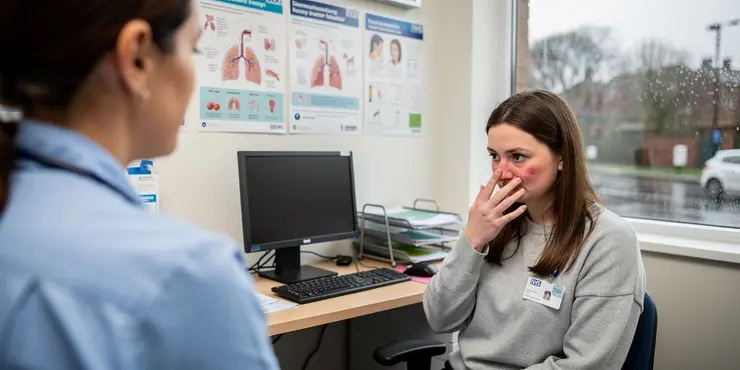
How does climate change affect pollen levels?
Relevance: 16%
-
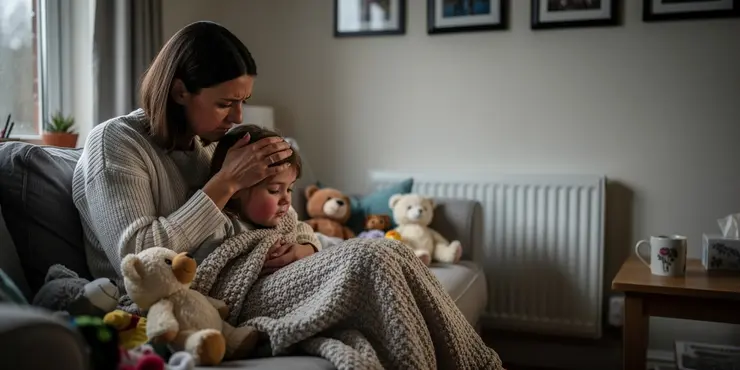
Advice if your child has... A High temperature
Relevance: 15%
-

What symptoms should I watch for if I suspect a mosquito-borne disease?
Relevance: 14%
-

Are Mosquito window screens effective?
Relevance: 14%
-

What diseases are spread by mosquitos in the UK in 2025?
Relevance: 14%
What is Hay Fever?
Hay fever, also known as allergic rhinitis, is a common allergic condition that affects many people in the United Kingdom. It occurs when the immune system overreacts to allergens in the air, leading to symptoms similar to a cold. Despite its name, hay fever is not caused by hay and does not result in a fever.
Causes of Hay Fever
Hay fever is triggered by exposure to specific allergens, commonly pollen from trees, grasses, and weeds. In the UK, tree pollen is prominent during spring, grass pollen in late spring and early summer, and weed pollen in late summer and autumn. Other triggers may include dust mites, pet dander, and mold spores, although these are more directly related to perennial allergic rhinitis.
Symptoms of Hay Fever
The symptoms of hay fever can be similar to those of a common cold, making it sometimes challenging to differentiate between the two. Common symptoms include sneezing, runny or blocked nose, itchy eyes, throat, or ears, and red or watery eyes. People with hay fever may also experience headaches, tiredness, and a loss of smell. Symptoms can vary in severity and can significantly impact daily activities and quality of life.
Diagnosis of Hay Fever
Diagnosis of hay fever is typically based on the presentation of symptoms and the time of year they occur. In some cases, a general practitioner may advise allergy testing through skin prick tests or blood tests to confirm specific allergens responsible for the symptoms. It's important for individuals who suspect they have hay fever to consult with a healthcare professional to rule out other conditions.
Treatment and Management of Hay Fever
There is no cure for hay fever, but treatments are available to help manage symptoms. Over-the-counter medications, such as antihistamines, can be effective in relieving symptoms by preventing the body's reaction to allergens. Nasal corticosteroids and decongestants may also be used to reduce inflammation and congestion. In more severe cases, a doctor may prescribe stronger medications or recommend immunotherapy as a long-term solution.
Prevention and Lifestyle Adjustments
While it may be challenging to completely avoid pollen, there are steps that individuals can take to minimize exposure and manage hay fever symptoms. Keeping windows and doors closed during high pollen counts, wearing wraparound sunglasses to protect the eyes, and showering after being outdoors to remove pollen from skin and hair can be effective strategies. Checking daily pollen forecasts and staying indoors when levels are high can also help reduce exposure.
Conclusion
Hay fever is a common condition that affects millions during specific times of the year. While it can be a nuisance, understanding the condition and taking proactive measures can help manage symptoms effectively. If you think you may have hay fever, consult with a healthcare professional for advice on managing your symptoms and improving your quality of life.
What is Hay Fever?
Hay fever is a common allergy. It is also called allergic rhinitis. Many people in the UK have it. It happens when your body reacts too much to things in the air. This makes you feel like you have a cold. Even though it is called hay fever, it is not caused by hay and it doesn’t give you a fever.
Causes of Hay Fever
Hay fever happens when you breathe in certain things called allergens. The most common one is pollen. Pollen comes from trees, grass, and weeds. In the UK, tree pollen is in spring, grass pollen is in late spring and early summer, and weed pollen is in late summer and autumn. Other things like dust mites, pets, and mold can also cause hay fever.
Symptoms of Hay Fever
Hay fever symptoms are a lot like a cold. You might sneeze, have a runny or blocked nose, and itchy eyes, throat, or ears. Your eyes can be red or watery. You might also get headaches, feel tired, and lose your sense of smell. Symptoms can be mild or strong and can affect how you feel every day.
Diagnosis of Hay Fever
Doctors can tell if you have hay fever by looking at your symptoms and when they happen. Sometimes they do special tests like skin pricks or blood tests. These help find out what you are allergic to. If you think you have hay fever, see a doctor to make sure it is not something else.
Treatment and Management of Hay Fever
There is no cure for hay fever, but you can treat the symptoms. Medicines like antihistamines can help stop your body from reacting to allergens. You can also use nasal sprays to help with a stuffy nose. If your symptoms are very bad, a doctor might give you stronger medicine.
Prevention and Lifestyle Adjustments
It is hard to stay away from pollen, but you can try a few things to help. Keep windows and doors closed when pollen is high. Wear sunglasses outside to protect your eyes. Take a shower after being outside to wash off pollen. Check pollen forecasts and stay inside when pollen levels are high.
Conclusion
Hay fever is a common problem at certain times of the year. It can be bothersome, but knowing more about it can help. Take steps to manage it, like seeing a doctor and using medicine. This can make your life better if you have hay fever.
Frequently Asked Questions
What is hay fever?
Hay fever, also known as allergic rhinitis, is an allergic reaction to outdoor or indoor allergens such as pollen, dust mites, pet dander, or mold.
What causes hay fever?
Hay fever is caused by the immune system overreacting to airborne allergens like pollen from grasses, trees, weeds, as well as dust mites, pet dander, and spores of mold.
What are the symptoms of hay fever?
Symptoms of hay fever include sneezing, runny or blocked nose, itchy eyes, mouth or skin, watery eyes, and fatigue.
How is hay fever diagnosed?
Hay fever is usually diagnosed by a health professional based on symptoms and medical history. Allergy tests, such as skin prick tests or blood tests, can help identify specific allergens.
Is hay fever the same as a cold?
No, hay fever is an allergic reaction while a cold is a viral infection. Hay fever does not cause fever, and its symptoms persist as long as the person is exposed to allergens.
Can hay fever lead to complications?
While hay fever itself is not serious, it can lead to complications such as sinusitis, ear infections, or asthma flare-ups if not properly managed.
What are common treatments for hay fever?
Common treatments for hay fever include antihistamines, nasal corticosteroids, decongestants, and allergy shots (immunotherapy).
Can lifestyle changes help manage hay fever symptoms?
Yes, avoiding allergens, keeping windows closed during high pollen days, using air purifiers, and regularly cleaning your living space can help manage symptoms.
When is hay fever season?
Hay fever season depends on the allergen. Tree pollen is common in spring, grass pollen in late spring and summer, and weed pollen in late summer and fall.
Can children have hay fever?
Yes, children can develop hay fever. Symptoms and management are similar to adults, but treatment should be appropriate for their age.
Is hay fever hereditary?
Hay fever can run in families. If one or both parents have allergies, their children are more likely to develop hay fever.
Can diet affect hay fever?
While diet does not directly cause hay fever, some foods can cross-react with pollen allergens, worsening symptoms. This is known as oral allergy syndrome.
Can hay fever be cured?
There is no cure for hay fever, but symptoms can be effectively managed through medications, lifestyle changes, and in some cases, immunotherapy.
Can I develop hay fever later in life?
Yes, it's possible to develop hay fever at any age, even if you did not have allergies as a child.
Do pets affect hay fever?
Yes, pet dander can trigger hay fever symptoms. Regular grooming and keeping pets out of bedrooms may help reduce exposure.
Are there natural remedies for hay fever?
Some people find relief with natural remedies such as saline nasal rinses, herbal supplements, or local honey, but these should be used with caution and under guidance.
How does weather affect hay fever?
Weather can impact pollen levels. Dry, windy days often have higher pollen counts, which can exacerbate hay fever symptoms.
Is hay fever contagious?
No, hay fever is not contagious. It is an allergic reaction and cannot be spread from person to person.
Why is it called hay fever?
The term 'hay fever' comes from the time of year hay is harvested and when people often experience symptoms, though hay itself is not the allergen for most people.
Can air pollution worsen hay fever?
Yes, air pollution can exacerbate hay fever symptoms by irritating the respiratory tract and combining with pollen to enhance allergic reactions.
What is hay fever?
Hay fever is when your nose gets runny and your eyes get itchy because your body doesn't like pollen from plants. It happens mostly in spring and summer when flowers and grass are growing.
Tips to feel better:
- Stay indoors on windy days.
- Wear sunglasses outside.
- Use tissues for your nose.
If you have questions, talk to a doctor or an adult you trust.
Hay fever is when you sneeze or have a runny nose because of things like pollen from flowers, dust, small bits from animals, or mold.
Why do people get hay fever?
Hay fever happens because of tiny things in the air called pollen. Pollen comes from plants like trees, grass, and flowers.
When a person with hay fever breathes in pollen, their nose and eyes get itchy and runny.
Some ways to help:
- Stay inside when there is a lot of pollen outside.
- Wear sunglasses to keep pollen out of your eyes.
- Ask a grown-up to help you find medicine if you feel bad.
Hay fever happens when your body reacts too strongly to things in the air. These things can be pollen from grass, trees, and weeds. It can also be dust mites, pet fur, and tiny bits of mold.
Helpful tools: Try using tissues for a runny nose and talk to a grown-up about medicines. Stay indoors when there are lots of pollens outside.
What happens when you have hay fever?
When you have hay fever, you might:
- Sneeze a lot
- Have a runny or stuffy nose
- Have itchy eyes that might get red
- Have an itchy throat
- Feel tired
Tools to help you:
- Use tissues for your nose
- Try wearing sunglasses outside
- Stay inside when there is lots of pollen
Hay fever can make you feel sneezy. You might have a runny or stuffed-up nose. Your eyes, mouth, or skin may feel itchy. Your eyes could water a lot. You might also feel very tired.
How do doctors know if someone has hay fever?
Doctors find out if you have hay fever by asking questions and doing tests.
Here is what might happen:
- Questions: The doctor will ask how you feel and what makes you sneeze or have a runny nose.
- Look at your nose and eyes: The doctor might check your nose and eyes to see if they are red or itchy.
- Skin test: The doctor might put a tiny bit of stuff on your skin to see if it makes a bump. This helps to find out what you are allergic to.
- Blood test: Sometimes, a doctor might check your blood to learn more about your allergies.
If you are having trouble, you can:
- Ask a family member to help you understand the doctor's questions.
- Use a picture book about hay fever to learn more.
Doctors can tell if you have hay fever by looking at your symptoms and asking about your health history. Tests like skin prick tests or blood tests can show what you are allergic to.
If reading is hard, you can use tools like text-to-speech apps to help. They read out loud for you. You can also ask someone you trust to read it with you.
Is hay fever the same as a cold?
Hay fever and a cold are not the same. They can feel similar, but they are different.
Hay fever is an allergy. It happens when your body does not like pollen from plants.
A cold is caused by a virus. You can catch a cold from other people.
Here are some tips to help you:
- Ask an adult if you need medicine.
- Rest and drink water.
- Use tissues for a runny or stuffy nose.
If you are not sure, talk to a doctor or an adult you trust.
No, hay fever and a cold are not the same. Hay fever is when your body reacts to things like pollen or dust. A cold is caused by a virus.
With hay fever, you don't get a fever. The symptoms stay as long as you're near the things that make you allergic.
If reading is hard, try listening to the text with a reading app or use pictures to help understand the words better.
Can hay fever cause other problems?
Hay fever is not very serious. But if you don't take care of it, it can cause other problems. You might get sore sinuses, ear infections, or your asthma could get worse.
What helps with hay fever?
Hay fever makes you sneeze and itch. Here are things that can help:
- Medicines: Doctors can give you pills or nose sprays.
- Stay inside: Close windows and doors to keep pollen out.
- Wash up: Take a shower and change clothes after being outside.
- Wear sunglasses: They keep pollen out of your eyes.
These steps can make you feel better. Ask a grown-up if you need help.
Here are some ways to help with hay fever:
- Take medicine called antihistamines.
- Use special nose sprays called nasal corticosteroids.
- Try decongestants to help with a stuffy nose.
- Get allergy shots from the doctor (this is called immunotherapy).
Can changing how you live help with hay fever?
If you have hay fever, changing some things you do every day might help you feel better.
Here are some tips you can try:
- Stay inside when there is a lot of pollen. Pollen is what makes hay fever worse.
- Keep windows closed to stop pollen from coming in. Use a fan if you need fresh air.
- Wash your face and hands often to keep pollen off your skin.
- Change your clothes after you have been outside.
- Try to dry clothes and sheets inside when pollen is high.
These things can help you feel better. You might also ask a doctor for more help.
Yes, to help with allergies:
- Stay away from things that make you sneeze, like pollen.
- Keep windows shut when there is a lot of pollen outside.
- Use machines that clean the air in your home.
- Clean your home often to keep it dust-free.
When does hay fever happen?
Hay fever is when you sneeze or have a runny nose because of plants. It happens at certain times of the year. Here is when:
- Spring: This is when many people get hay fever because of tree pollen.
- Summer: Grass pollen can cause hay fever during this time.
- Fall: Weeds like ragweed can make people feel bad in the fall.
Some helpful tips:
- Wear sunglasses to keep pollen out of your eyes.
- Keep windows closed to stop pollen from coming inside.
- Try using tissues and allergy medicine if you feel bad.
Hay fever happens at different times of the year. It depends on what you are allergic to. In spring, trees let out pollen. In late spring and summer, grass lets out pollen. In late summer and fall, weeds let out pollen.
Can kids get hay fever?
Yes, kids can get hay fever. Hay fever is when your body doesn’t like stuff like pollen from flowers, grass, or trees.
If your kid has hay fever, they might sneeze a lot, get a runny nose, or have itchy eyes. It can feel like a cold, but it’s not because of germs.
Here are some things that can help:
- Try to keep windows and doors closed to keep pollen out.
- Make sure your child washes their face and hands after playing outside.
- You can talk to a doctor about special medicines that help with hay fever.
It's a good idea to help kids understand what makes them feel unwell.
Yes, kids can get hay fever. The signs and how to handle it are like for grown-ups. But, the care needs to be right for how old they are.
Can you get hay fever from your parents?
Hay fever can run in families. This means if your parents have hay fever, you might get it too.
Some tips to help:
- Talk to a doctor if you feel unwell.
- Use tissues to help stop sneezes.
- Avoid being outside when pollen is high.
There are medicines that can help with hay fever. Ask an adult if you need help.
Hay fever can happen more in some families. If mom or dad have allergies, their kids might get hay fever more easily too.
Can food change hay fever?
Hay fever can make you sneeze and your eyes itch. Some food can make hay fever better or worse. Eating healthy food like fruits and vegetables may help. Drinking lots of water can be good too.
If you have hay fever, talk to a doctor or a nurse. They can help you find out what food is best for you. Using a food diary to track what you eat might be helpful too.
Eating certain foods can make hay fever symptoms worse. This is because some foods have stuff in them that is like pollen. This is called oral allergy syndrome.
Can we fix hay fever?
No, we cannot make hay fever go away forever. But, we can help make it easier to handle.
You can:
- Ask a doctor for medicine.
- Stay inside when there is a lot of pollen outside.
- Keep windows closed when there is a lot of pollen.
- Wear sunglasses to protect your eyes.
- Wash your clothes and take a shower after being outside.
These tips can help make hay fever less of a problem.
We can't make hay fever go away completely. But we can help the symptoms feel better. You can use medicine, change some things you do every day, or try special treatments from the doctor.
Can I get hay fever when I am older?
Yes, you can start getting hay fever when you are older. It can happen at any age. Hay fever is an allergy to things like pollen from trees and flowers.
Some tips to help with hay fever:
- Stay inside when there is lots of pollen outside. Check pollen counts on the weather report.
- Keep windows closed to stop pollen from coming in.
- Shower and change clothes after being outside to remove pollen.
- You can use allergy medicines. Talk to a doctor or pharmacist for advice.
- Use tissues or a mask to cover your nose and mouth.
Yes, you can get hay fever at any age, even if you didn’t have it when you were a child.
Do pets make hay fever worse?
Having a pet might make your hay fever worse. Pets can bring pollen inside the house on their fur. This can make you sneeze or have itchy eyes.
If you have hay fever, here are some things you can do:
- Keep pets out of your bedroom.
- Brush pets often to get rid of pollen.
- Clean your home to remove pollen.
Yes, pets can make hay fever symptoms worse because of their fur. Brushing your pet often and not letting them into bedrooms might help you feel better.
Can flowers and plants help with hay fever?
Hay fever is when you sneeze and have a runny nose because of pollen. Pollen comes from trees, flowers, and plants.
Some people try using things from nature to feel better. This can include:
- Herbal teas: Drinking warm tea can help you feel calm.
- Spices: Some people say spicy foods clear their noses.
- Saltwater rinse: Washing your nose with salty water can help clean it.
Always talk to a grown-up or a doctor before trying new things.
Some people feel better when they use natural things like saltwater nose washes, herbal medicines, or local honey. But be careful and get help from a grown-up or a doctor when using them.
How does weather change hay fever?
Let's see how weather can make hay fever better or worse.
- Rain: When it rains, it washes pollen away. This can make hay fever feel better.
- Wind: Wind blows pollen around. This can make hay fever feel worse.
- Warm Weather: On warm days, more flowers open. This can make more pollen and make hay fever worse.
- Cold Weather: On cold days, there is less pollen. This can make hay fever feel better.
Try using tissues and stay indoors when pollen is high. You can also try wearing sunglasses and closing windows to keep pollen out.
The weather can change how much pollen is in the air. When it is dry and windy, there is usually more pollen. This can make hay fever worse.
Can you catch hay fever from someone else?
No, you cannot catch hay fever from other people. Hay fever is not like a cold or the flu. It is not spread from person to person.
Hay fever happens when pollen from plants makes some people's noses and eyes itchy. It is a kind of allergy.
If you have hay fever, here are some tips to help:
- Stay indoors on days when there is a lot of pollen.
- Keep windows closed to stop pollen from coming inside.
- Wash your hands and face after being outdoors.
It can be helpful to talk to a doctor if you need more ideas to feel better.
No, hay fever is not something you can catch from someone else. It is an allergy and does not spread between people.
Why do we call it hay fever?
'Hay fever' is a name people use. It comes from when farmers collect hay. This is also when some people feel sick.
But hay is not what makes people feel sick. It is usually other things like pollen from flowers and trees.
Does dirty air make hay fever worse?
Yes, dirty air can make hay fever worse. It bothers the nose and throat. Dirty air can mix with pollen and make allergies stronger.
Useful Links
This website offers general information and is not a substitute for professional advice.
Always seek guidance from qualified professionals.
If you have any medical concerns or need urgent help, contact a healthcare professional or emergency services immediately.
Some of this content was generated with AI assistance. We’ve done our best to keep it accurate, helpful, and human-friendly.
- Ergsy carfully checks the information in the videos we provide here.
- Videos shown by Youtube after a video has completed, have NOT been reviewed by ERGSY.
- To view, click the arrow in centre of video.
- Most of the videos you find here will have subtitles and/or closed captions available.
- You may need to turn these on, and choose your preferred language.
- Go to the video you'd like to watch.
- If closed captions (CC) are available, settings will be visible on the bottom right of the video player.
- To turn on Captions, click settings .
- To turn off Captions, click settings again.
More Items From Ergsy search
-

What is hay fever?
Relevance: 100%
-

Hay fever advice | NHS
Relevance: 94%
-

Do masks help with hay fever?
Relevance: 93%
-

Can hay fever be prevented?
Relevance: 93%
-

What are the common symptoms of hay fever?
Relevance: 92%
-

Is there a link between hay fever and asthma?
Relevance: 92%
-

Can children develop hay fever?
Relevance: 91%
-

Can hay fever occur year-round?
Relevance: 90%
-

Are some people more prone to hay fever?
Relevance: 89%
-

Do pets contribute to hay fever?
Relevance: 88%
-

Is hay fever more common in urban areas?
Relevance: 88%
-

Can diet influence hay fever symptoms?
Relevance: 88%
-

Antihistamines how they work with hay fever
Relevance: 87%
-

Can hay fever symptoms mimic other conditions?
Relevance: 86%
-

Do all plants produce pollen that causes hay fever?
Relevance: 86%
-

How does pollen affect people with hay fever?
Relevance: 85%
-

Why are experts warning of rising hay fever cases?
Relevance: 85%
-

Self care - hay fever itchy eyes
Relevance: 84%
-

Experts Warn of Rising Hay Fever Cases as Pollen Counts Surge
Relevance: 81%
-

Can mosquito screens help reduce hay fever symptoms?
Relevance: 77%
-

Are there any treatments for hay fever?
Relevance: 68%
-

How long does a typical hay fever season last?
Relevance: 58%
-

Caring for a child with fever | NHS
Relevance: 40%
-

Can dengue fever be contracted in the UK?
Relevance: 39%
-

Is there a risk of yellow fever being spread by mosquitoes in the UK?
Relevance: 39%
-

How to treat glandular fever | NHS
Relevance: 39%
-

Which medication should be avoided for children with fevers?
Relevance: 37%
-

What is Dengue Fever?
Relevance: 33%
-

Can lifestyle changes help manage pain and fever during pregnancy?
Relevance: 32%
-
Can Dengue fever be transmitted through blood transfusions?
Relevance: 30%
-

What are some common conditions treated with homeopathy?
Relevance: 18%
-

Dealing with Seasonal Allergies
Relevance: 17%
-

Are there safer alternatives to paracetamol for pregnant individuals experiencing pain or fever?
Relevance: 17%
-

Are any vaccines available in the UK for mosquito-borne diseases?
Relevance: 17%
-

Who is at risk of developing eczema?
Relevance: 17%
-

How does climate change affect pollen levels?
Relevance: 16%
-

Advice if your child has... A High temperature
Relevance: 15%
-

What symptoms should I watch for if I suspect a mosquito-borne disease?
Relevance: 14%
-

Are Mosquito window screens effective?
Relevance: 14%
-

What diseases are spread by mosquitos in the UK in 2025?
Relevance: 14%


